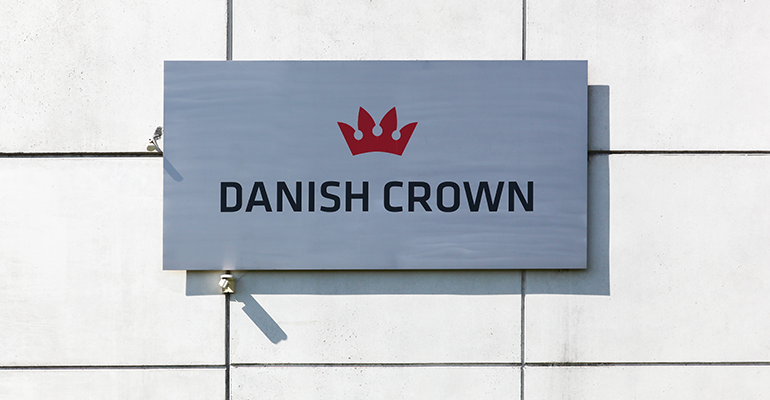News
Danish Crown’s ‘climate-controlled’ claim misleading, court finds
20 Mar 2024Leading EU pork producer Danish Crown has been found guilty of greenwashing by misleading consumers with marketing claims about its “climate-controlled” pork and “climate-friendly” production.
In the case of Vegetarian Society et al. of Denmark v Danish Crown, Danish non-governmental organisations (NGOs) including Danish Vegetarian Association and the Climate Movement in Denmark sued Danish Crown, a leading pork producer in the EU.

Bringing the claim in May 2021, the NGOs claimed the company deceived consumers through one of its marketing campaigns, which said that the pork is “more climate-friendly than you would think” and that its pork production is “climate controlled”.
On 1 March 2024, the court ruled that the first phrase was not considered misleading, however, it found the second phrase violated section five of the Danish Marketing Practices Act for misrepresenting the environmental impact of the company’s products.
The court found that Danish Crown had put round pink stickers on its packaging claiming pigs were ‘climate-controlled’. The label had not been subject to independent control, restricting a typical consumer’s ability to decide about the product’s environmental benefits. The company stopped using the label in 2021.
“I note that the judgement supports Danish Crown on three out of four claims,” says Nør-Pedersen. However, the court agreed with the NGOs that Danish Crown’s Climate Road programme was strong enough to warrant labelling the meat ‘climate-controlled’.
“The court acknowledges that the statement ‘Danish pork is more climate-friendly than you think’ is well-supported with the necessary documentation in the specific case,” says Nør-Pedersen. It is crucial for Agriculture & Food and our member companies that this can be fulfilled,” Nør-Pedersen adds.
A clear message
Industry campaigners, including Danish Agriculture & Food Council, Vegetarian Society of Denmark and Climate Movement have highlighted how the court ruling sends an emphatic statement on the pig, meat and wider food sector’s legal stance on greenwashing claims.
“The case is of principle, and the judgement emphasises the need for clearer rules on how companies can communicate about the measures they take to produce food with a lower climate footprint,” Flemming Nør-Pedersen, director of Danish Agriculture & Food Council told Ingredients Network.
In a move that may set a precedent for other companies’ communication approach and marketing claims about their sustainability initiatives, the court ruling has loudened the calls to end greenwashing.
The cooperative company, which over 6,000 Danish farmers own, is committed to lowering greenhouse gas (GHG) emissions by 50% by 2030. The court ruling highlighted greenwashing, with the claimants successfully arguing that the Danish Crown misrepresented its climate impact and violated the Marketing Act.
 © AdobeStock/Ricochet64
© AdobeStock/Ricochet64
Danish Crown denied the claims. With its campaign, the company sought to communicate that its farmers actively work to lower their carbon dioxide (CO2) footprint and that external players monitor their CO2 reduction targets. Danish Crown argued that as the pigs were raised on farms with a “clear strategy for reducing CO2 emissions”, this did not amount to misleading its consumers.
Wider sustainability stance
On 22nd November 2023, the same week the court case commenced, Danish Crown released its annual statement for 2022/2023, communicating the company’s “strong revenue growth amid challenging conditions.” The year marked the first time the company published an integrated annual report covering financial statements and environmental, social, and governance (ESG) reporting.
In the report, Danish Crown highlighted its “high climate ambitions,” confirming it obtained approval for its climate targets from the UN-backed Science Based Targets initiative in November 2022. It also highlighted that it has prepared an ambitious science-based timetable for a more sustainable future by 2030.
Danish Crown plans to lower its global emissions by 42% in Scopes 1 and 2 and by 20% in Scope 3, representing approximately a reduction of 2.5 million tonnes of CO2 between 2020 and 2030. To meet the Danish parliament’s ambition of reducing emissions by 70%, Denmark needs to decrease emissions by 20 million tonnes of CO2 from 1990 to 2030.
“Our climate ambitions are a central tool in our efforts to consolidate our position as one of the leading food companies in Europe,” Jais Valeur, managing director of the Danish Crown said at the time. “We must help our customers reduce their environmental footprint, and we are currently negotiating partnerships with several multinational customers based on our climate ambitions and detailed reporting,” Valeur added.
Sustainability in Denmark’s pig produce
Denmark is globally recognised for its pig production and pig meat processing, almost doubling its output over the past 30 years due to a high degree of specialisation and continuous. The agricultural sector contributes 22% to the total Danish export of goods, the Danish Agriculture and Food Council reported in its Denmark – a Food and Farming Country 2023 report.
According to the report, Denmark has one of the world’s most resource-effective and climate-efficient food production systems. It stated that environmental sustainability is a central point in Danish pig production, which is steadily improving.
In February 2024, Ernst Young reported how companies can increase the credibility of climate claims and develop consumer trust. As the ESG reporting space continues to shift, the consulting services provider says companies can enhance their sustainability claims’ credibility by adopting standardisation, due diligence over procurement decisions, goal setting, progress reporting, and assurance.
Related news

Ultra-processed food intake in South Africa at concerning levels, study suggests
19 Mar 2024
As South Africa considers introducing front-of-pack warning labels and strict marketing limits for unhealthy foods, research has found that low-income South Africans get around half of their calories from ultra-processed foods (UPFs) – “a cause for con...
Read more
Brazilian manufacturers must comply with warning label regulation, says court
7 Mar 2024
The Federal Court of São Paulo has ruled that Brazilian manufacturers must comply with front-of-pack labelling regulation that requires unhealthy products to feature warning labels, scrapping a last-minute one-year extension.
Read more
US pet food regulations unravel the mysteries of product labelling
4 Mar 2024
New regulations governing the labelling of pet foods were approved by AAFCO members last July, providing the first major update to pet food regulations in 40 years. The move was a response to pet owners asking for clarity on labels that left many confu...
Read more
Pesticide residues in conventional baby food: A boost for organic?
29 Feb 2024
Nearly four in 10 (38%) of conventional US baby food products contain pesticide residues, according to research that also found that the organic samples were pesticide-free. Could this be an opportunity for organic or ‘pesticide-free’ produce?
Read more
Singapore's Islamic council: Cultivated meat can be halal
16 Feb 2024
The Islamic Religious Council of Singapore (MUIS) has said that cultivated meat consumption is permissible as halal under certain conditions, and where a more “rigorous” set of requirements are needed to ensure consumer assurance.
Read more
‘Not for EU’ label signals confusion and extra costs
6 Feb 2024
With affordability, variety, and choice paramount in today’s uncertain landscape, concerns exist around the UK’s “Not for EU” label.
Read more
Plant-based and processed: Avoiding the next big health debate
2 Feb 2024
Calls for clarity around ultra-processed food (UPFs) and ongoing debates on potential classification may bring the health credentials of plant-based food under the spotlight, which is why education is so necessary.
Read more
Is it useful to classify foods as ultra-processed?
26 Jan 2024
The term ‘ultra-processed’ is gaining traction – and notoriety. But does it help consumers make healthier food choices or encourage manufacturers to make their ultra-processed products healthier? Food industry stakeholders explored the term’s usefulnes...
Read more
‘Healthy’ additives make ultra-processed foods more appealing
4 Jan 2024
Almost three-quarters (74%) of Americans would try an ultra-processed food if it provided a health benefit such as better sleep, better immunity, or increased energy, according to an industry survey.
Read more